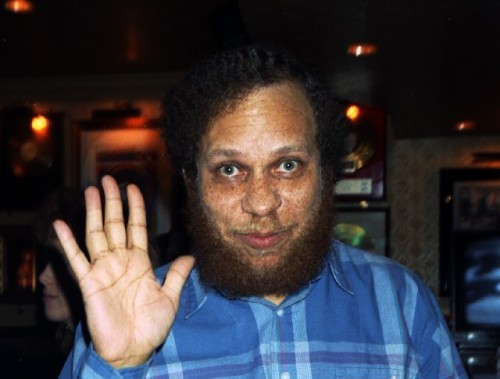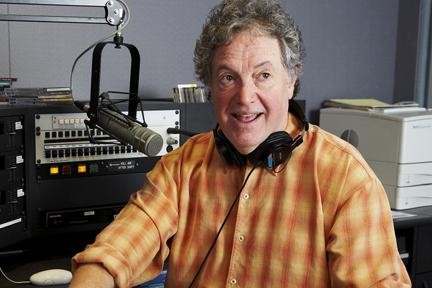WGBH Slashes Jazz Programming
Radio Community Reacts Supporting Eric Jackson and Steve Schwartz
By: Ed Bride - Jun 22, 2012
This week's news that WGBH is downgrading its local jazz programming by more than 50% has ignited a firestorm in the tightly-knit community of jazz announcers. Veteran announcers Eric Jackson and Steve Schwartz, with combined service of more than 55 years in jazz radio, were informed that Eric's long-running weekday show (Mon-Thurs, 8pm-midnight) would be moved to the weekend, and Steve's Friday evening program will be terminated.
In the mind of this veteran listener, jazz advocate, and sometime writer/announcer, this is nothing less than a cultural travesty. Having just celebrated 30 years on the air, Eric Jackson is the Dean of New England jazz broadcasters, and his show is now diminished to weekends, when many listeners are hopefully in the clubs or social gatherings enjoying the product served 'live.' And Schwartz' show is now cast aside like a wilted salad. The elimination of weekday jazz on one of New England's premier NPR stations, in what is arguably New England's cultural hub –Boston—is effective July 2, and will represent a sad day for Jazz, indeed.
The decision is making waves far beyond WGBH's signal, spawning an active and passionate discussion on the Jazz Programmers List [JPL], an email forum for those interested in jazz radio. JPL members include announcers ("programmers," in today's parlance), promoters, musicians, educators, advocates and plain old fans. In an interview at KUVO in Denver, Panama-born pianist Danilo Perez told Arturo Gomez that the WGBH decision was "an outrage," especially given that the community includes the New England Conservatory, the Berklee College of Music, and "a significant jazz musicians and followers community."
Perez was also reached in Denver by Boston Globe reporter Joseph Kahn. "That's some tragic news," he told Kahn. "In a culture where we are so much in need of hope and optimism, that's what jazz is all about. As long as people listen to radio, it's crucial to have jazz [featured] there."
Beyond that, Perez told the Globe, "People like Eric and Steve love and know the music. To a listener like myself, it's almost like having a History of Jazz class on the radio."
Both shows have a lengthy history in Boston, notes PR maven Sue Auclair. A highly-regarded promoter of the arts, especially jazz, Auclair wrote that "These programs are extremely important to proliferation of the music, the artists, the jazz clubs and the jazz festivals in the region and all related businesses, sponsorships."
Brad Stone, music director of KSJS in San Jose, who always signs his email "The light is on," simply commented: "The light is dimmer."
Mike Schwartz (no relation to Steve), host of a jazz show on the same station, KSJS, wrote directly to WGBH management, and posted his letter publicly. Commenting that WGBH's jazz programming is available world-wide on the Internet and is among the best of its kind, Mike Schwartz said that WGBH is "not serving your listeners, your community or anyone, quite frankly, by unwisely making it go away."
One wonders about the extent and nature of any research that WGBH did, prior to making this momentous decision. While much of the NPR community is gravitating to the news/talk format, this migration has not been universally successful.
For example, Leslie Keros, of WHPK in Chicago, recalls that 6 years ago, WBEZ in that city also eliminated local night-time jazz programming from the schedule. "If it had been replaced by local programming of equal value, the station would have been more readily forgiven, but the time was squandered on syndicated programming or, worse, reruns," she emailed to WGBH Managing Director Phil Redo. The decision earned WBEZ "the lasting enmity of the jazz community, and from it arose a sizeable group of former listeners who to this day refuse to support the station. I won't lecture you on the rich history of jazz in Boston--surely you know this--but I urge you to reconsider." Keros' email, which she then published publicly, concluded, "don't make the same mistake WBEZ did."
Will it work in Boston? That is, will the change in programming help WGBH retain listeners and grow its bank account? Shauna Machosky, who formerly programmed much of the jazz offerings of the late WDUQ in Pittsburgh, doesn't think so. She has "no faith that a move to a single-format news/information will benefit anyone, especially the rich Boston music and arts community. I do not believe WGBH will be more successful."
About a year ago, WDUQ was purchased by an organization that changed the format to news/information and scuttled all but a few hours of jazz on Saturday evenings, she says, down from about 100 hours a week. Almost a year since the sale of the station and format change, WESA (formerly WDUQ) has had "consistently abysmal ratings," writes Machosky. "WDUQ averaged a 3 to 3.3 audience share in Pittsburgh. The new WESA has averaged a 1.2 share or less. Astonishing."
As to the reliable, syndicated programming in Pittsburgh's NPR scene: Morning Edition, All Things Considered and Fresh Air all remain in the slots in which they had been heard on WDUQ. The local news that had always been a part of WDUQ has not changed on WESA, either, she says, adding "Apparently the jazz programming is missed." She says that local media have reported a 50% drop in overall listeners to the station. One wonders if WGBH will suffer the same fate.
Don Polletta of WCPN in Cleveland doesn't think the news/talk format will be the savior, either. "Many NPR stations are seeing a leveling off or a decline in their numbers. When stations started dumping music for the news/talk format 20 years ago, the Internet wasn't the all consuming power it is now," he writes. "I don't need to wait to hear a discussion of some topic on NPR on my local station. I can go to the web to find [Talk of the Nation] anytime I want...plus the web offering multiple ways to get the same info NPR offers...be it other radio...access to tons of newspapers or sites that aggregate news...plus podcasts...the explosion of cable news...the news/talk product NPR offers isn't as unique as it once was."
Indeed, Mike Stratton, who hosts "The Vinyl Side of Midnight" on WLNZ in Lansing, Michigan, wonders if the move will backfire. His station also cut back on jazz two years ago, although unlike Schwartz, WLNZ kept his Stratton's show because of its popularity. In a letter to WGBH management, Stratton wrote, "And now, after two years, [WLNZ] is starting to add more jazz. The loss of revenue from a lack of support and the sense of betrayal in the community just couldn't be overcome. I wonder if you'll come to the same conclusion."
Although stations may have differing points of view (NPR vs. Fox vs. MSNBC vs. Clear Channel),"by the end of the day, unless you are the hardest hard core news junkie, you've heard the same material discussed over and over," writes Stratton
The community of jazz supporters isn't sitting on its hands. Witness:
- Lois Gilbert, who runs one of the world's most popular websites, JazzCorner.com, offered to send out an email to her 20,000 list "as a petition to reinstate jazz programming," as well as start a twitter campaign, to convince WGBH management to change its mind.
- A Facebook page has even been started, in an attempt to get WGBH management to reverse its decision: http://www.facebook.com/groups/122003261274426/
- Mark Rini and Joshua Ellman, whose company GROOV Marketing and Consulting handles the recordings of dozens of jazz labels, including Blue Note, also wrote to WGBH. Making their letter public, they commented, "It's a travesty that a city as great as Boston, home to many fine and nationally renowned Jazz Clubs and with such a deep history in the music, is going to be left with so little of it on its airwaves. You are doing a disservice to the art form, as well as the many Jazz fans in Boston." Rini and Ellman continue expressing a "hope [that] you reconsider this decision. Mr. Schwartz and Mr. Jackson deserve more respect than this and so does the music."
Whether WGBH, which broadcasts for a living, will now do some listening, is the question of the day.
Polletta of WCPN responds to all these efforts with a challenge of his own: "While it is difficult to make management change its mind, once they make a decision....financial pressure can make them reconsider. Let us see if the Boston jazz community can muster the kind of juice the news/talk crowd has to apply some heat."
However they decide, they're certainly in the jazz limelight for now.
© 2012 Edward Bride




